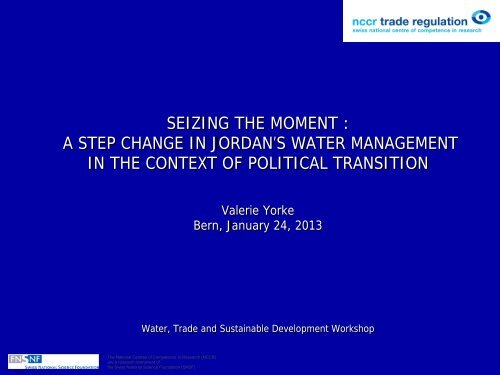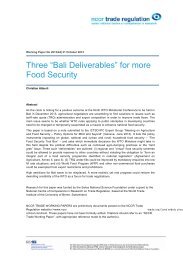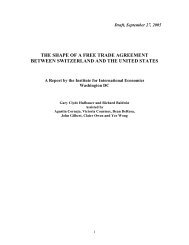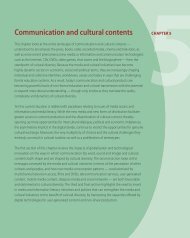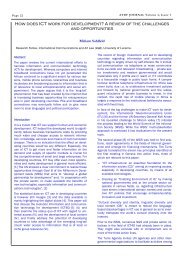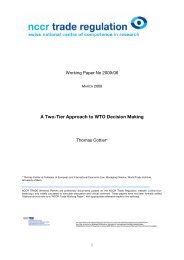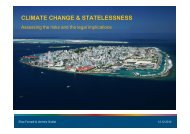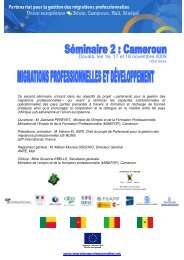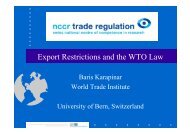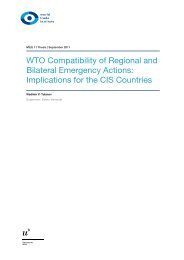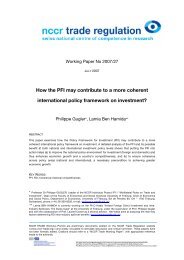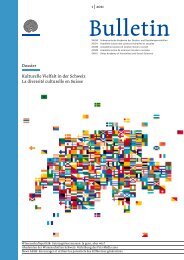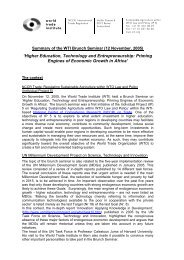Presentation Valerie Yorke (NCCR Trade Regulation) - World Trade ...
Presentation Valerie Yorke (NCCR Trade Regulation) - World Trade ...
Presentation Valerie Yorke (NCCR Trade Regulation) - World Trade ...
You also want an ePaper? Increase the reach of your titles
YUMPU automatically turns print PDFs into web optimized ePapers that Google loves.
SEIZING THE MOMENT :<br />
A STEP CHANGE IN JORDAN’S WATER MANAGEMENT<br />
IN THE CONTEXT OF POLITICAL TRANSITION<br />
<strong>Valerie</strong> <strong>Yorke</strong><br />
Bern, January 24, 2013<br />
Water, <strong>Trade</strong> and Sustainable Development Workshop<br />
The National Centres of Competence in Research (<strong>NCCR</strong>)<br />
are a research instrument of<br />
the Swiss National Science Foundation (SNSF)
CONTEXTUALIZING JORDAN WATER SCARCITY:<br />
Recognising politics must drive solutions<br />
CLIMATE CHANGE<br />
• “Rio cannot afford to ignore politics”...Can we collectively challenge vested<br />
interests to move towards a more constructive politics” (<strong>World</strong> Today, 2012)<br />
MENA<br />
• “Reforms need political as well as technical champions”<br />
(<strong>World</strong> Bank on MENA water , 2007)<br />
JORDAN<br />
• “Jordan’s water strategy is politically challenged and its water crisis cannot<br />
be resolved by water reforms alone.”<br />
• “There is urgent need for a bold new approach that links political reform..<br />
to a mix of water solutions ..” (<strong>Valerie</strong> <strong>Yorke</strong>, 2013)<br />
28.04.2013 1<br />
The National Centres of Competence in Research (<strong>NCCR</strong>)<br />
are a research instrument of<br />
the Swiss National Science Foundation (SNSF)
PRESENTATION STRUCTURE :<br />
Recognising politics must drive solutions<br />
• Jordan’s water problem<br />
• Meeting the challenge : governance; part of the problem<br />
• Political dynamics, ‘political bargains’, and water<br />
• Politics must drive solutions<br />
28.04.2013 2<br />
The National Centres of Competence in Research (<strong>NCCR</strong>)<br />
are a research instrument of<br />
the Swiss National Science Foundation (SNSF)
THE PROBLEM IS STRAIGHTFORWARD : DEMAND EXCEED SUPPLY<br />
Realistic picture of water balances 2015-2025*<br />
Supply<br />
• Safe yield +<br />
projects (committed / financed)<br />
• No RSDS conveyor before 2025<br />
Summary of Projected Supply (safe yield /projects underway) and Demand<br />
2015-2025<br />
MCM<br />
Demand<br />
• Capped agriculture - 700 MCM<br />
• Demand exceeds renewable supply by<br />
growing margin<br />
Deficit<br />
• 2015 300 MCM<br />
• 2020 469 MCM<br />
• 2025 630 MCM<br />
Virtual water (2008)<br />
73% of water footprint (6.27 BCM)<br />
1600<br />
1400<br />
1200<br />
1000<br />
800<br />
600<br />
400<br />
200<br />
0<br />
2015 2020 2025<br />
Supply (safe yield/projects) 929 929 929<br />
Projected demand 1229 1398 1559<br />
Deficit 300 469 630<br />
* Source:<br />
Author’s projections based on MWI Water Balance 2010-25<br />
(2012)<br />
28.04.2013 3<br />
The National Centres of Competence in Research (<strong>NCCR</strong>)<br />
are a research instrument of<br />
the Swiss National Science Foundation (SNSF)
PROBLEM IS POLITICALLY COMPLEX<br />
Power asymmetry, international cross border flows feed uncertainty<br />
• 90% arid (ann. rainfall declining)<br />
• 4 th most water deprived (refugees)<br />
-> per cap 145 CM / yr, and falling<br />
• 80% supplies = surface & renewable groundwater,* but<br />
– significant proportion trans-boundary<br />
– Jordan downstream<br />
– no bilateral accord on joint management (Syria);<br />
unsatisfactory accord (Israel)<br />
• 8% supplies = fossil water* (SA / no accord)<br />
• Climate change (threat multiplier)<br />
* 2010 figures<br />
28.04.2013 4<br />
The National Centres of Competence in Research (<strong>NCCR</strong>)<br />
are a research instrument of<br />
the Swiss National Science Foundation (SNSF)
PART OF THE PROBLEM: GOVERNANCE<br />
Policy record over two decades: disappointing outcomes<br />
PLUS SIDE<br />
• Commitment / strategies target:<br />
• Demand management<br />
• Reformists in sector<br />
• Royal Water Committee<br />
• Donor-Jordanian collaboration<br />
‣ Some progress:<br />
– Senior decision-makers involved<br />
– Infrastructure (WWTPs)<br />
– PSP impacts – NRW reduction; safer<br />
drinking water<br />
– Slowdown in depletion of aquifers<br />
(Groundwater Law, HWF)<br />
– Modest decline in Ag’s share to the<br />
advantage of municipalities<br />
28.04.2013 5<br />
The National Centres of Competence in Research (<strong>NCCR</strong>)<br />
are a research instrument of<br />
the Swiss National Science Foundation (SNSF)
II. GOVERNANCE; PART OF THE PROBLEM<br />
Policy record over two decades<br />
BUT<br />
• WRM efforts fail to produce hoped-for improvements<br />
• Data reflect dangerous trends:<br />
‣ declines in precipitation, surface water<br />
‣ water use -> mainly low value & inefficient agriculture (66% water; 3.5% GDP)<br />
‣ groundwater over-abstraction -> depleting aquifers<br />
‣ municipal supply intermittent -> pollution & health risks<br />
‣ poor cost recovery; state subsidies unsustainable<br />
‣ widening deficits; water constraints inhibit growth<br />
Explained by :<br />
• Partial, uncoordinated reforms;<br />
‣ weak water institutions no match for powerful vested interests who resist reforms<br />
(tariffs, well regulation, crops, PSP)<br />
• Impact of non-water policies (agriculture, trade, finance, interior) on outcomes<br />
• Donors’ failure to make conditionality stick<br />
28.04.2013 6<br />
The National Centres of Competence in Research (<strong>NCCR</strong>)<br />
are a research instrument of<br />
the Swiss National Science Foundation (SNSF)
‘AN INCONVENIENT TRUTH’ :<br />
POLITICS DRIVE POOR WATER RESOURCE MANAGEMENT<br />
• Asymmetric power: Israel (hegemon); Syria (upstream); S. Arabia (shared aquifer)<br />
• History of regime, survival strategy, cooption of social groups, patronage / rents<br />
• Political bargain ties traditional landowning elites /merchants -> networks of ‘shadow state’<br />
social contract binds people to throne; with privileges / benefits exchanged for allegiance;<br />
• Water provision integral to exchange (political tool, asset, cheap service)<br />
• Restructuring of political bargain -1989 -> entrenching anti-reformist groups with interests<br />
in allocations, subsidisation, light regulation<br />
• Resilience of complex web of power in face of Arab Spring<br />
Throne enjoys legitimacy; reluctant to devolve power ; divide & rule<br />
Tribal elite want more power, but don’t want to share it<br />
Insufficient bottom up pressure – weak parties, communal divides; no agreed agenda<br />
• Strategic location and donor support -> postpones crises / difficult choices<br />
• Crises of monarchy and state only a matter of time<br />
28.04.2013 7<br />
The National Centres of Competence in Research (<strong>NCCR</strong>)<br />
are a research instrument of<br />
the Swiss National Science Foundation (SNSF)
WATER DEFICIT CHALLENGE CAN BE MET<br />
Bold political approach - prioritising water - must drive solutions<br />
• Only new ‘political bargain’ can drive ‘step change’ in water governance; technical solutions not enough<br />
• National leaders must:<br />
‣ put water at top of national agenda (strategic significance for national security & socio economic<br />
development and centrality of non-sector policies for regional / national WRM)<br />
‣ formally mandate integrated planning - prioritising water at true cost, aligning management with<br />
policies to deliver economic growth<br />
‣ act now to put water sector on politically, financially, environmentally sustainable path, priority to:<br />
A. Exploiting scope for indispensable demand / supply side efficiency improvements (Short-long term)<br />
‣ NRW reduction to conserve low cost water / raise revenues : 55->80 MCM (2020->2025)<br />
‣ Cross-sectoral Highlands Water Strategy with ‘carrots and sticks’ to increase irrigation efficiency &<br />
productivity, conserve renewable low cost supplies, protect aquifers, enhance adaptive capacity<br />
‣ Increased wastewater treatment / re-use in agriculture - 40->130 MCM (2015-2025)<br />
‣ Attention to revenue raising -> study of tariff & tax restructuring for fairer targeting of subsidies<br />
B. Pursuing affordable new water supply projects (Medium-long term)<br />
‣ Desalination plant at Aqaba (100 MCM)<br />
‣ Public commitment to to RSDSWC subject to consultations (530 MCM)<br />
28.04.2013 8<br />
The National Centres of Competence in Research (<strong>NCCR</strong>)<br />
are a research instrument of<br />
the Swiss National Science Foundation (SNSF)
WATER DEFICIT CHALLENGE CAN BE MET<br />
Bold political approach, prioritising water to drive solutions<br />
C. Endorsing / supporting regional initiatives to manage shared resources sustainably<br />
(Medium-long term)<br />
‣ pursue bilateral accords to close medium-term deficit (Israel - 50 MCM, Syria 100 MCM)<br />
‣ Help lay foundation for Regional Water Community through supporting initiatives to advance<br />
regional vision on shared resources<br />
‣ support studies on inward transfer of Turkish water, lest RSDSWC idea fails<br />
D. Intensifying international diplomacy in support of above (Short term->)<br />
‣ Draw on improved inter-ministerial communications / shared single source data<br />
‣ New PM to join Water Council; technicians posted to Royal Diwan, foreign & finance ministries;<br />
‣ Negotiate new frame with donors for cash transfers & reform-related conditions / ensure it sticks<br />
28.04.2013 9<br />
The National Centres of Competence in Research (<strong>NCCR</strong>)<br />
are a research instrument of<br />
the Swiss National Science Foundation (SNSF)
Thank you<br />
<strong>Valerie</strong> <strong>Yorke</strong><br />
Consultant, <strong>NCCR</strong> <strong>Trade</strong> <strong>Regulation</strong><br />
28.04.2013 10<br />
The National Centres of Competence in Research (<strong>NCCR</strong>)<br />
are a research instrument of<br />
the Swiss National Science Foundation (SNSF)
Total water resources<br />
892 MCM (2010)<br />
28.04.2013 11<br />
The National Centres of Competence in Research (<strong>NCCR</strong>)<br />
are a research instrument of<br />
the Swiss National Science Foundation (SNSF)
28.04.2013 12<br />
The National Centres of Competence in Research (<strong>NCCR</strong>)<br />
are a research instrument of<br />
the Swiss National Science Foundation (SNSF)


